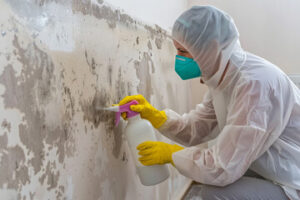Mold removal requires the help of a professional. They will do a thorough inspection, moisture survey and air quality assessment. They will also find the source of the moisture that promoted the growth and correct it.

This will eliminate the spores and prevent further regrowth. They will use antimicrobial sprays on porous surfaces, like drywall and wooden wall studs. Visit https://utahmoldremovalandremediation.com to learn more.
The first step in mold remediation is putting containment measures in place. The goal is to prevent the spread of mold spores in the air. Professionals close all windows and doors, sealing moldy areas with six-mil plastic sheeting to isolate the infestation. Air filtration devices are also used to control the movement of spores through the air and keep them from contaminating unaffected areas.
The next step is to remove and discard moldy building materials, including drywall, insulation and carpeting. Nonporous materials like tiles and countertops are usually salvageable, but they must be cleaned with antimicrobial agents and dry thoroughly. Porous materials should be discarded, because they will not return to their normal appearance even after thorough cleaning and drying.
If a material is infested with mold and cannot be removed, the homeowner should replace it with a similar product that is resistant to fungal growth. The same goes for any water-damaged drywall, carpeting and insulation.
During the cleanup process, professionals must use proper personal protective equipment (PPE) to avoid contact with mold and other harmful microorganisms. They can choose from a variety of cleaning and disinfecting methods, depending on the type of material involved.
In addition to cleaning and disinfecting, the experts should fix any underlying problems that could cause future mold problems. They should also test the air and surface for moisture, odors and toxicity after remediation is complete.
After a clearance testing certificate is received, the homeowners can restore their home to its pre-remediation condition. It is important to fix the original problem, as it will prevent the spread of mold spores and other contaminants throughout the house. A mold inspection should be done regularly to ensure that the mold does not recur. If it does, the property owner should call a remediation company immediately. The expert should be able to provide a detailed remediation plan and prevent the problem from recurring. They should also provide a warranty for their work. The warranty should include a guarantee that they will clean and remove all the mold infested materials. The company should also offer a free inspection of the affected area within 10 days of completion of the remediation.
Cleaning
When the mold remediation process is complete, a professional inspector will test the air quality to ensure that the spores are gone. Once the test shows that the mold spores are no longer present, the home is ready to be reoccupied. However, cleaning of the impacted areas is still necessary to prevent new mold growth.
The first step in cleaning is typically to HEPA vacuum the entire affected area. The specialized vacuuming equipment is designed to prevent the microscopic mold spores that are sucked up from being redistributed back into the air. The professionals will also use a mask and rubber gloves to protect themselves.
After the vacuuming, the surface must be scrubbed to remove any remaining mold spores. The type of cleaner used will depend on the type of material and level of contamination. Surfaces made of wood can be cleaned with standard bleach. A stronger cleaner is needed for surfaces that are porous, such as grout. A solution made with a 3% hydrogen peroxide and a standard dish detergent is typically effective for these types of surfaces.
More stubborn surface mold can be cleaned with baking soda paste or undiluted vinegar. These solutions are typically more effective than bleach at killing mold roots and are much safer for surfaces that cannot be scuffed. The baking soda paste and vinegar solutions should be left to sit for a few hours before scrubbing and rinsing.
The final step in a successful cleanup is to seal the cleaned surfaces. This will help to prevent future mold outbreaks by blocking the air from the dampness that is a key element in fungal growth. If the surface was covered with a moldy carpet, for example, the carpet must be disposed of and replaced with an anti-fungal carpet.
Prevention is the best medicine when it comes to mold damage. Regular cleaning can help to reduce the number of mold spores in a house, and moisture control is crucial for mitigating indoor mold growth. The most important thing to do, however, is to get a mold inspection and call in the professionals when there are signs of a serious problem.
Disposal
Once mold has been cleaned or removed, it must be properly disposed of in order to keep the spores from being dispersed into other areas. This is often the job of a professional mold remediation company that has the ability to transport large amounts of hazardous waste and dispose of it safely. Regardless of who is doing the disposal, all items that were infested with mold should be taken outside as quickly as possible and never left in an indoor trash can.
Depending on the type of material, different methods of disposal are used. Some of these include using vinegar on hard surfaces, hydrogen peroxide, or baking soda to kill spores and then cleaning the area. Other materials like porous surfaces and fabrics may need to be discarded if they cannot be adequately cleaned and treated. During the disposal process, it is important to wear protective gloves and goggles to prevent inhalation or contact with spores. Keeping a rag nearby to wipe the area when applying any cleaners is also recommended.
Once the work area is cleaned and free of any infested materials, it should be sealed off to prevent further spread. This can be done with plastic sheets or a professional air remediation system. In many cases, a mold inspector will also do a pre-testing of the air to confirm that the area is safe for re-entry.
It is also important to fix any water problems immediately and dry all areas thoroughly. This will help prevent further mold growth and reduce the risk of water damage to wood and other materials. Finally, it is a good idea to use fans and open windows to help with the drying process.
After all, mold can cause a wide variety of health problems in humans and pets. In some cases, the symptoms can be severe and may require medical attention. Those with certain health conditions, such as diabetes or a weakened immune system, are at a greater risk of developing a serious reaction to mold spores. If you are experiencing symptoms of mold exposure, you should consult your doctor right away.
Prevention
Mold isn’t just unsightly; it can also cause health problems. Mold can trigger allergic reactions and respiratory issues in some people. It can also damage property and devalue a home or business. The good news is that there are some simple steps you can take to prevent the fungi from growing in your home.
One of the most important factors in preventing mold is controlling moisture. Mold thrives in damp environments, so it’s a good idea to regularly check problem areas such as bathrooms, kitchens and basements. Make sure they’re well-ventilated and that appliances like laundry machines and stoves vent to the outside. You can also install a dehumidifier or use an exhaust fan in your bathroom during showers and when cooking.
Another way to prevent mold is by making sure water leaks are repaired immediately. Leaks in roofs, walls or pipes can create ideal conditions for the growth of mold in a building or house. Fixing the problem as soon as possible will prevent the spread of mold and other harmful bacteria.
It’s also important to keep in mind that mold can be hidden from view. If you’re not sure what type of mold is present, it’s a good idea to consult a professional for testing and a remediation plan. Different species of mold can look very similar, and it’s difficult to tell which is the dangerous one. Some species of mold, such as Stachybotrys chartarum (black mold), can be toxic and cause a range of illnesses.
The CDC does not recommend sampling or culturing mold to determine what kind it is. This is because different types of mold can affect people in different ways, and testing can’t tell you whether it’s safe or not. If you have a mold problem, it’s important to clean up and dry the affected area as quickly as possible.
Mold can be removed from most hard surfaces with commercial products, soap and water or a bleach solution (1 cup of household bleach in 1 gallon of water). Do not paint over the mold, as it will grow back.


